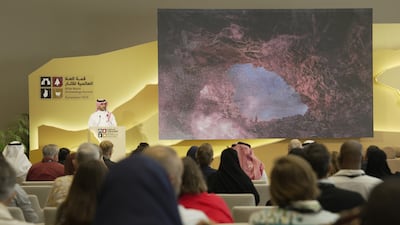Leading international experts in cultural heritage returned to AlUla, Saudi Arabia, on Wednesday for a major archaeology gathering.
AlUla World Archaeology Symposium, which features nearly 100 of the industry’s most prominent names, aims to survey the key concerns facing the discipline and to cement AlUla as a global hub for the field moving forward.
“This is a land rich in treasures and ancient civilisations, a historic meeting point for cultural exchange on a global scale,” said Abdulrahman Alsuhaibani, vice president of culture for the Royal Commission of AlUla, in his opening remarks. “We hope to broaden understanding and to draw inspiration from the past, to guide the present, and enhance the future by protecting the cultural heritage both here and across the world."
The event follows last year’s AlUla World Archaeological Summit, which united experts with students and enthusiasts from Saudi Arabia to promote the field of study to a wider audience in the kingdom.
The symposium, which features academics and scientists from 34 countries, is a more inward-looking affair, exploring not only the latest understanding of mobile communities, some of which once inhabited the area in north-west Saudi Arabia, but the flawed methodology that has traditionally plagued the field and miscoloured understanding of nomadic and Bedouin peoples.
“We’re very good at identifying changes, but we are also here to talk about what should change in our own approach,” said Laura Morabito, a senior manager of cultural heritage at the Royal Commission of AlUla.

The historically problematic field of archaeology has drastically matured over the past 100 years, allowing experts to work out a strong understanding of ancient civilisations such as that of the Nabataeans who once carved their tombs into the rocks of Hegra in Saudi Arabia. But nomadic communities have proven more difficult to grasp, which experts now realise is largely a problem of their own making.
“We’ve realised that we have long had a very western way of looking at the world. We need to focus on the decolonisation of archaeology and cultural heritage,” said Willeke Wendrich, professor emeritus at the University of California, Los Angeles. Wendrich also explained that colonisation is not merely defined by an invading power that takes physical control of an inhabited land, but by the effects that central powers have over local communities.
Wendrich, who has worked for 35 years in Egypt, follows what she calls a teaching-learning continuum in her approach to studying mobile communities, in which both scientist and subject are equal partners in each study.
“Although there are clear vestiges of colonialism in archaeology, things have changed,” said Wendrich. “We’re really trying to live this teaching-learning continuum, and part of that is about taking inventory of the material culture, and how we do that.”
Wendrich presented her findings on the Ababda people of Berenike, Egypt, who still reside in the area of the ancient port. Spending time with the community, Wendrich spoke with members to best understand what they find important to mutually decide what is most worth preserving.
She said: “We made a collection together and created an exhibit doing everything according to the rules in the collection. The whole collection started with me asking one of the people we work with: ‘What is important to collect?’ He said everything that goes onto a camel, and there is a lot that goes onto a camel, from tassels to handbags,” said Wendrich. “And when we asked the women, they said everything used to make coffee.”

One key misunderstanding of Bedouin and other desert-based communities in particular is rooted in the western idea of the desert itself – an orientalist, Lawrence of Arabia-esque romanticisation of an empty space made thrilling by a fear of the unknown. The area becomes something to be conquered and its resources something to be exploited.
But this paradigm is on its face misguided, experts at the symposium warned. Stefano Biagetti, a professor at Pompeu Fabra University in Barcelona, echoed Wendrich, saying that, for mobile communities, the desert is not empty – it is home. And within their traditions is a deep wealth of knowledge that needs to be understood on the terms of the community itself. And those insights are invaluable, particularly in the sciences of sustainability.
“Academic science is dominated by western paradigms,” said Biagetti. “But there are sciences everywhere, each that has its own rules of transmission and a body of knowledge that was not made in universities. Everything related to pastoralism is related to this, for example. And there is a huge body of knowledge about practising sustainability in the desert – it’s not about merely surviving, they want to be there.”
The symposium, which runs until Thursday, will also feature discussions on how climate change has affected mobile communities, the impact of war and the role of indigenous communities in preserving cultural heritage sites.


